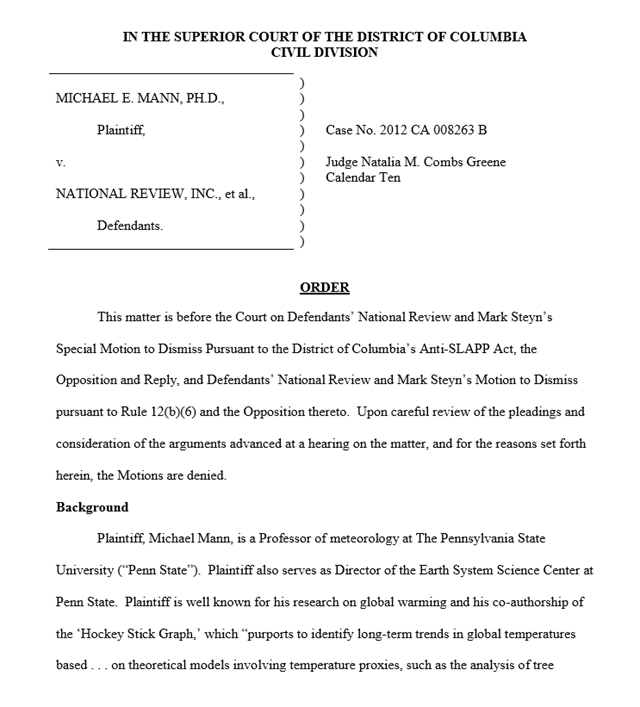DC Court affirms climate scientist Michael Mann’s right to proceed in defamation lawsuit against National Review and CEI
19 July 2013 (Climate Science Watch) – Two decisions handed down July 19 in DC Superior Court affirmed climate scientist Michael Mann’s right to proceed in his defamation lawsuit against the Competitive Enterprise Institute and the National Review Online for their statements accusing him of data manipulation and fraud. The Court is not buying the Defendants’ arguments in their Motion to Dismiss that their statements are protected speech under the First Amendment, mere “opinion,” “rhetorical hyperbole,” or “fair comment.” Full text of the decisions: On the National Review’s Motion to Dismiss On the Competitive Enterprise Institute’s Motion to Dismiss We quote below several excerpts from the CEI decision (underlining added):
“Defendants argue that the accusation that Plaintiff’s work is fraudulent may not necessarily be taken as based in fact because the writers for the publication are tasked with and posed to view work critically and interpose (brutally) honest commentary. In this case, however, the evidence before the Court, at this stage, demonstrates something more and different that honest or even brutally honest commentary.” [at 14-15] “Given the dictionary definition as well as the common readers’ thought about the use of these words (fraud and fraudulent) the Court finds that these statement taken in context must be viewed as more than honest commentary—particularly when investigations have found otherwise. Considering the numerous articles that characterize Plaintiff’s work as fraudulent, combined with the assertions of fraud and data manipulation, the CEI Defendants have essentially made conclusions based on facts.” [at 15] The definition of “bogus” in the Merriam-Webster online dictionary, inter alia, is “not genuine … sham.” BOGUS, MERRIAM-WEBSTER: ONLINE DICTIONARY AND THESAURUS, http://www.merriam-webster.com/dictionary/bogus. In Plaintiff’s line of work, such an accusation is serious. To call his work a sham or to question his intellect and reasoning is tantamount to an accusation of fraud (taken in the context and knowing that Plaintiff’s work has been investigated and substantiated on numerous occasions).” [at 15-16] “Having been investigated by almost one dozen bodies due to accusations of fraud, and none of those investigations having found Plaintiff’s work to be fraudulent, it must be concluded that the accusations are provably false. Reference to Plaintiff, as a fraud is a misstatement of fact.” [at 19] “Plaintiff has been investigated several times and his work has been found to be accurate. In fact, some of these investigations have been due to the accusations made by the CEI Defendants. It follows that if anyone should be aware of the accuracy (or findings that the work of Plaintiff is sound), it would be the CEI Defendants. Thus, it is fair to say that the CEI Defendants continue to criticize Plaintiff due to a reckless disregard for truth. Criticism of Plaintiff’s work may be fair and he and his work may be put to the test. Where, however the CEI Defendants consistently claim that Plaintiff’s work is inaccurate (despite being proven as accurate) then there is a strong probability that the CEI Defendants disregarded the falsity of their statements and did so with reckless disregard.” [at 21] [more]

This is some great news! IMHO, as far as I can tell most of these right wing supposed "Think Tanks" are nothing more than liars for the rich, and it is s nice to see someone finally call them out for it!
This is some great news! IMHO, as far as I can tell most of these right wing supposed "Think Tanks" are nothing more than liars for the rich, and it is s nice to see someone finally call them out for it!